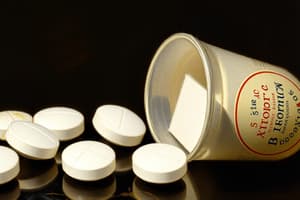Podcast
Questions and Answers
What is the classification of Ketorolac (Toradol)?
What is the classification of Ketorolac (Toradol)?
Nonsteroidal anti-inflammatory agent
What is the mechanism of action (MOA) of Ketorolac (Toradol)?
What is the mechanism of action (MOA) of Ketorolac (Toradol)?
NSAIDs inhibit cyclooxygenase and prevent the synthesis of prostaglandins and thromboxane, which reduce inflammation and ultimately provide pain relief
What is the onset time for Ketorolac (Toradol)?
What is the onset time for Ketorolac (Toradol)?
Rapid
What are the indications for prescribing Ketorolac (Toradol)?
What are the indications for prescribing Ketorolac (Toradol)?
Which of the following are contraindications for Ketorolac (Toradol)? (Select all that apply)
Which of the following are contraindications for Ketorolac (Toradol)? (Select all that apply)
What precautions should be taken when using Ketorolac (Toradol)?
What precautions should be taken when using Ketorolac (Toradol)?
What are some common side effects of Ketorolac (Toradol)?
What are some common side effects of Ketorolac (Toradol)?
The recommended dose of Ketorolac (Toradol) is ___ mg IM or ___ mg IV.
The recommended dose of Ketorolac (Toradol) is ___ mg IM or ___ mg IV.
Flashcards are hidden until you start studying
Study Notes
Ketorolac (Toradol) Overview
- Ketorolac is classified as a nonsteroidal anti-inflammatory agent (NSAID).
- Primarily used for its analgesic properties in managing pain.
Mechanism of Action (MOA)
- Inhibits cyclooxygenase (COX) enzymes.
- Reduces synthesis of prostaglandins and thromboxane, which alleviates inflammation and provides pain relief.
Pharmacokinetics
- Exhibits rapid onset of action.
Indications
- Effective for treating mild to moderate pain.
- Specifically indicated for pain associated with renal calculi (kidney stones).
Contraindications
- Not suitable for individuals with allergies to any NSAIDs.
- Should be avoided in patients with active gastrointestinal bleeding.
- Not recommended for patients requiring immediate surgical intervention for obvious fractures.
Precautions
- Use with caution in patients having renal or hepatic (liver) disease due to potential risk factors.
Side Effects
- Increases the risk of bleeding, particularly when administered with other NSAIDs.
Dosage
- Typical dosing includes 60 mg intramuscularly (IM) or 30 mg intravenously (IV).
- Recommended to halve the dose in patients over 65 years of age.
Studying That Suits You
Use AI to generate personalized quizzes and flashcards to suit your learning preferences.




